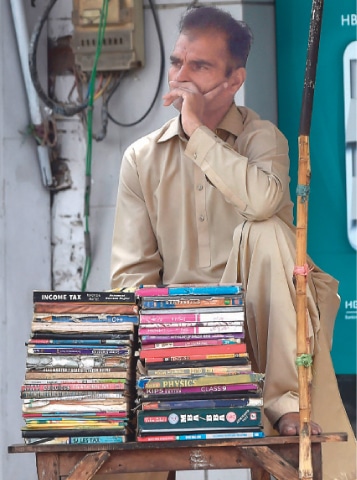
• Coronavirus cases cross 20,000 mark as minister fears 18m may lose jobs
• Asad Umar says only one person in India and two in Pakistan per million population died during the 46 days after the first 100 cases
ISLAMABAD: While the countrywide tally of coronavirus cases has more than doubled in less than two weeks, Planning and Development Minister Asad Umar on Sunday said the pandemic could also result in closure of up to one million institutions, rendering 18 million people jobless and pushing up to 70m others below the poverty line in Pakistan.
The federal minister was quoting the figures predicted by different organisations and think tanks, during a media briefing held at the National Command and Operation Centre (NCOC) on Covid-19.
The only option, for damage control, was to relax the restrictions/ lockdown, Mr Umar said, adding that the government would decide the fate of the restrictions in a meeting of the National Coordination Committee on Covid-19 scheduled for May 9.
The number of confirmed coronavirus cases has crossed 20,000 mark with 459 deaths recorded across the country. In the past two days only, the deadly virus claimed at least 55 lives. Nearly two dozen deaths were being reported daily on an average, Mr Umar said, adding that initially the daily average was two deaths.
However, the minister said, “We are living in a region which is blessed for unknown reason. If we compare number of deaths in the first 46 days of the disease, after attaining 100 cases, 414 persons per million population died in Spain, 305 in Italy, 256 in France, 248 in the UK and 106 persons per million population died in the US.”
In Pakistan only two persons and in India only one person per million population died in the first 46 days after attaining the figure of 100 cases, he said, adding that the reason could be hot weather, BCG vaccine or being located in malaria belt.
At this average around 720 people would die in a month across the country, where 4,800 people died in traffic accidents every month but road traffic was not banned due to fatal accidents, Mr Umar said to build his point that restrictions should be relaxed.
The federal minister said that as compared to March, the revenue of Federal Board of Revenue (FBR) was reduced by Rs119 billion in April.
With every passing day problems were increasing and the government had been left with no option but to open businesses, he said, adding that even in the US 30 million people had become jobless.
The minister said that every business could not be opened due to the fear that the health system might collapse. “But we need to open business gradually to maintain a balance in number of cases and economic activities.
“We have 5,000 intensive care beds, out of which 1,500 will be used for Covid-19 patients and 23 of them are being used. We have 5,000 ventilators, of which 1,400 will be used for Covid-19 patients and currently there are 35 patients on ventilators. Moreover, we will get another 900 ventilators in coming days,” he said.
The minister said: “We had relaxed restrictions on April 14 and will again decide about further relaxing the restrictions on May 9. Moreover we have testing capacity of 14,000 which can be doubled if we run machines on double shifts. On Saturday, we conducted over 9,000 tests and number of tests will be increased in coming days.”
Mr Umar said a number of European countries, despite 20,000 deaths in each one of them, decided to relax the lockdown.
“We also need to do same as people have started asking that what will happen if disease would not be controlled at all. According to a Gallup survey, Pakistanis are being affected the most due to unemployment. We need to increase job opportunities and ensure that the health system does not collapse,” he said.
Published in Dawn, May 4th, 2020











































